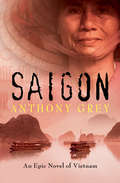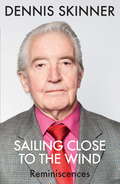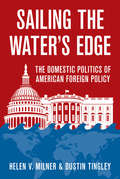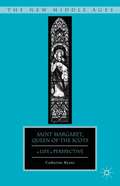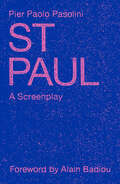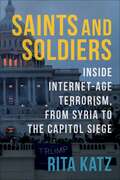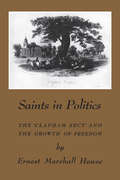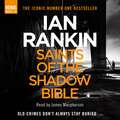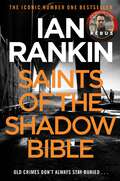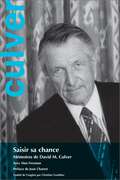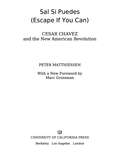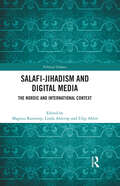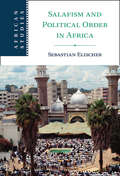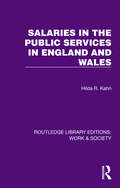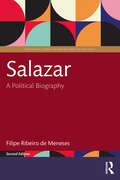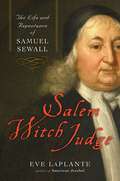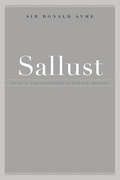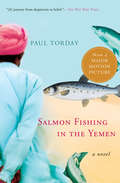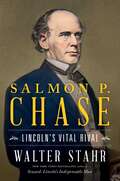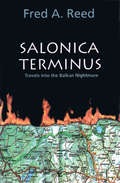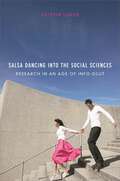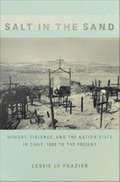- Table View
- List View
Saha: The new novel from the author of Kim Jiyoung, Born 1982
by Cho Nam-JooIn a country called ‘Town’, Su is found dead in an abandoned car. The suspected killer is presumed to come from the Saha Estates. <p><p> Town is a privatised country, controlled by a secretive organisation known as the Seven Premiers. It is a society clearly divided into the haves and have-nots and those who have the very least live on the Saha Estates. Among their number is Jin-Kyung, a young woman whose brother, Dok-yung, was in a relationship with Su and quickly becomes the police’s prime suspect. <p><p> When Dok-yung disappears, Jin Ky-ung is determined to get to the bottom of things. On her quest to find the truth, though, she will uncover a reality far darker and crimes far greater than she could ever have imagined. At once a dystopian mystery and devastating critique of how we live now, Saha lifts the lid on corruption, exploitation and government oppression, while, with deep humanity and compassion, showing us the lives of those who, through no fault of their own, suffer at the hand of brutal forces far beyond their control.
Saigon: An Epic Novel of Vietnam
by Anthony GreyAn epic saga of twentieth-century Vietnam hailed by the San Francisco Chronicle as "the War and Peace of our age"Joseph Sherman first visits Saigon, the capital of French colonial Cochin-China, in 1925 on a hunting expedition with his father, a US senator. He is lured back again and again as a traveler, a soldier, and then as a reporter by his fascination for the exotic land and for Lan, a mandarin's daughter he cannot forget.Over five decades Joseph's life becomes enmeshed with the political intrigues of two of Saigon's most influential families, the French colonist Devrauxs, and the native Trans--and inevitably with Vietnam's turbulent, wartorn fate. He is there when the hatred of a million coolies rises against the French, and when the French Foreign Legion fights its bloody last stand at Dien Bien Phu. He sees US military "advisors" fire their first shots in America's hopeless war against the red tide of Communist revolution and tries to salvage something of lasting value on a desperate helicopter flight out of defeated Saigon.At once a story of adventure, love, war, and political power, Saigon presents an enthralling and enlightening depiction of twentieth-century Vietnam.
Sailing Close to the Wind: Reminiscences
by Dennis Skinner Kevin MaguireDennis Skinner, the famed Beast of Bolsover, is adored by legions of supporters and respected as well as feared by admiring enemies. Fiery and forthright, with a prodigious recall, Skinner is one of the best-known politicians in Britain. He remains as passionate and committed to the causes he champions as on the first day he entered the House of Commons back in 1970. In an age of growing cynicism about politicians, the witty and astute Skinner is renowned as a brightly burning beacon of principle. He has watched Prime Ministers come and go - Heath, Wilson, Callaghan, Thatcher, Major, Blair, Brown - and yet remains uncorrupted by patronage and compromise. Cameron discovered Skinner's popularity when a public backlash forced the current PM to apologise in Parliament for calling Skinner a dinosaur who should be in a museum. Skinner at eighty has a unique take on post-war Britain. A combatant in the great social, industrial and political upheavals of the last half century, he's resisted telling his extraordinary story. Until now.
Sailing the Water's Edge
by Helen V. Milner Dustin TingleyWhen engaging with other countries, the U.S. government has a number of different policy instruments at its disposal, including foreign aid, international trade, and the use of military force. But what determines which policies are chosen? Does the United States rely too much on the use of military power and coercion in its foreign policies? Sailing the Water's Edge focuses on how domestic U.S. politics--in particular the interactions between the president, Congress, interest groups, bureaucratic institutions, and the public--have influenced foreign policy choices since World War II and shows why presidents have more control over some policy instruments than others. Presidential power matters and it varies systematically across policy instruments.Helen Milner and Dustin Tingley consider how Congress and interest groups have substantial material interests in and ideological divisions around certain issues and that these factors constrain presidents from applying specific tools. As a result, presidents select instruments that they have more control over, such as use of the military. This militarization of U.S. foreign policy raises concerns about the nature of American engagement, substitution among policy tools, and the future of U.S. foreign policy. Milner and Tingley explore whether American foreign policy will remain guided by a grand strategy of liberal internationalism, what affects American foreign policy successes and failures, and the role of U.S. intelligence collection in shaping foreign policy. The authors support their arguments with rigorous theorizing, quantitative analysis, and focused case studies, such as U.S. foreign policy in Sub-Saharan Africa across two presidential administrations.Sailing the Water's Edge examines the importance of domestic political coalitions and institutions on the formation of American foreign policy.
Sailor in the Whitehouse
by Robert F. CrossThis behind-the-scenes look at Franklin D. Roosevelt's extraordinary skill as a blue-water sailor explores how FDR's love of the sea shaped his approach to public service and even influenced the course of events in World War II. Family and friends, Secret Service agents, and others reveal never-before-told stories of their days afloat with America's greatest seafaring president, including how he escaped injury when fire broke out aboard his small schooner, how ships were modified to accommodate his disability, and details of his wartime ocean rendezvous with Winston Churchill. Sailing pals discuss his abilities as a skipper along with his enjoyment of an evening cocktail at sea during the days of Prohibition. Letters and other documents illustrate how the sea was never far from Roosevelt's thoughts.Robert Cross examines Roosevelt's great affection for the sea in the context of an era dominated by the Great Depression and two world wars. While some criticized Roosevelt for taking too many seagoing trips-he lagged hundreds of thousands of miles at sea and was sometimes out of touch with the White House and the Secret Service for hours-FDR was quick to explain that his lengthy voyages allowed him to personally assess the world situation instead of relying solely upon White House briefing books. The author argues that the skills required to be a good sailor have much in common with those needed to be a successful politician: the ability to alter courses, make compromises, and shift positions as the situation warrants. Cross describes FDR as a master at dealing with the unexpected, allowing him to excel in the Navy Department, the governor's mansion, and the White House, as well as the open sea. From luxury ocean liners and presidential yachts to submarines and kayaks, this book lists all of the vessels on which FDR sailed and includes some never-before-published photographs.
Saint Margaret, Queen Of The Scots
by Catherine KeeneMargaret, saint and 11th-century Queen of the Scots, remains an often-cited yet little-understood historical figure. Keene's analysis of sources in terms of both time and place - including her Life of Saint Margaret , translated for the first time - allows for an informed understanding of the forces that shaped this captivating woman.
Saint Paul
by Pier Paolo PasoliniPresented here for the first time in English is a remarkable screenplay about the apostle Paul by Pier Paolo Pasolini, legendary filmmaker, novelist, poet, and radical intellectual activist. Written between the appearance of his renowned film Teorema and the shocking, controversial Salò, or the 120 Days of Sodom, St Paul was deemed too risky for investors. At once a political intervention and cinematic breakthrough, the script forces a revolutionary transformation on the contemporary legacy of Paul. In Pasolini's kaleidoscope, we encounter fascistic movements, resistance fighters, and faltering revolutions, each of which reflects on aspects of the Pauline teachings. From Jerusalem to Wall Street and Greenwich Village, from the rise of SS troops to the death of Martin Luther King, Jr, here--as Alain Badiou writes in the foreword--'Paul's text crosses all these circumstances intact, as if it had foreseen them all'. This is a key addition to the growing debate around St Paul and to the proliferation of literature centred on the current turn to religion in philosophy and critical theory, which embraces contemporary figures such as Alain Badiou, Slavoj i ek and Giorgio Agamben.From the Hardcover edition.
Saints and Soldiers: Inside Internet-Age Terrorism, From Syria to the Capitol Siege (Columbia Studies in Terrorism and Irregular Warfare)
by Rita KatzMore than a decade ago, counterterrorism expert Rita Katz began browsing white supremacist and neo-Nazi forums. The hateful rhetoric and constant threats of violence immediately reminded her of the jihadist militants she spent her days monitoring, but law enforcement and policy makers barely paid attention to the Far Right. Now, years of attacks committed by extremists radicalized online—including mass murders at a synagogue in Pittsburgh and mosques in Christchurch, New Zealand, as well as the Capitol siege—have brought home the danger. How has the internet shaped today’s threats, and what do the online origins of these movements reveal about how to stop them?In Saints and Soldiers, Katz reveals a new generation of terrorist movements that don’t just use the internet, but exist almost entirely on it. She provides a vivid view from the trenches, spanning edgy video game chat groups to what ISIS and Far-Right mass-shooters in El Paso, Orlando and elsewhere unwittingly reveal between the lines of their manifestos. Katz shows how the online cultures of these movements—far more than their ideologies and leaders—create today’s terrorists and shape how they commit “real world” violence. From ISIS to QAnon, Saints and Soldiers pinpoints the approaches needed for a new era in which arrests and military campaigns alone cannot stop these never-before-seen threats.
Saints in Politics: The 'Clapham Sect' and the Growth of Freedom
by Enrest HowseThis book gives a picture of an important religious reform group in action during the period of the French Revolution, Napoleon, and the Industrial Revolution. In this period of injustice and misery the British ruling classes, frightened by the excesses of the French Revolution, determined, at a time when economic life was changing at a rate unequalled for centuries, that existing laws and institutions should not change. And yet from this time came the moral, philanthropic, and religious ideas which transformed later England and resulted in the abolition of the slave trade, educational reforms in India, emancipation of Negroes in the British possessions, popular education and the growth of Sunday schools in England, reform of the whole penal and judicial system, industrial and parliamentary reform, and a new spirit of religious tolerance and philanthropy. The moving force in human progress at this epoch was a "brotherhood of Christian politicians" lampooned in Parliament, during their lifetime, as "the Saints" and remembered in history as "The Clapham Sect," led by Wilberforce. Dr. Howse brings together for the first time in this book material on all the activities of the Sect. He gives us sketches of members of the Set, their life as a group at home, and in the midst of their campaigns, where novel methods and ceaseless labour brought results out of all proportion to the size of the group.
Saints of the Shadow Bible: From the Iconic #1 Bestselling Writer of Channel 4’s MURDER ISLAND (A Rebus Novel)
by Ian RankinRebus is back on the force, albeit with a demotion and a chip on his shoulder. A 30-year-old case is being reopened, and Rebus's team from back then is suspected of foul play. With Malcolm Fox as the investigating officer are the past and present about to collide in a shocking and murderous fashion? And does Rebus have anything to hide?His colleagues back then called themselves 'the Saints', and swore a bond on something called 'the Shadow Bible'. But times have changed and the crimes of the past may not stay hidden much longer, especially with a referendum on Scottish independence just around the corner. Who are the saints and who the sinners? And can the one ever become the other?Features a bonus interview with Ian Rankin and James MacPhersonRead by James MacPherson. JAMES MACPHERSON played DCI Jardine in Taggart for sixteen years, and has acted on stage in plays as diverse as The Taming of the Shrew and ART by Yasmina Reza. He has presented a regular books programme for Radio Scotland - for which he has interviewed Ian Rankin. He won a Spoken Word Gold Award for his reading of Strip Jack, a Crimefest Audible UK Sounds of Crime Award for Doors Open and has narrated all the Ian Rankin Rebus books. James lives in Glasgow.(p) 2013 Orion Publishing Group
Saints of the Shadow Bible: The number one bestselling series that inspired BBC One’s REBUS (A Rebus Novel)
by Ian RankinOld crimes don't stay buried...From the No.1 bestselling author of A SONG FOR THE DARK TIMES'Ian Rankin is a genius' Lee Child'A first-rate thriller but also a forensic examination of contemporary Scottish society' INDEPENDENT ON SUNDAYRebus is back on the force, albeit with a demotion and a chip on his shoulder. A 30-year-old case is being reopened, and Rebus's team from back then is suspected of foul play. With Malcolm Fox as the investigating officer, are the past and present about to collide in a shocking and murderous fashion? And does Rebus have anything to hide? His old colleagues called themselves 'the Saints', and swore a bond on something called 'the Shadow Bible'. But times have changed and the crimes of the past may not stay hidden much longer, especially with a referendum on Scottish independence just around the corner. Who are the saints and who are the sinners? And can the one ever become the other?**** Ian Rankin's SAINTS OF THE SHADOW BIBLE was a #1 Sunday Times bestseller w/c 8th September 2014
Saints of the Shadow Bible: The number one bestselling series that inspired BBC One’s REBUS (A Rebus Novel)
by Ian RankinOld crimes don't stay buried...From the No.1 bestselling author of A SONG FOR THE DARK TIMES'Ian Rankin is a genius' Lee Child'A first-rate thriller but also a forensic examination of contemporary Scottish society' INDEPENDENT ON SUNDAYRebus is back on the force, albeit with a demotion and a chip on his shoulder. A 30-year-old case is being reopened, and Rebus's team from back then is suspected of foul play. With Malcolm Fox as the investigating officer, are the past and present about to collide in a shocking and murderous fashion? And does Rebus have anything to hide? His old colleagues called themselves 'the Saints', and swore a bond on something called 'the Shadow Bible'. But times have changed and the crimes of the past may not stay hidden much longer, especially with a referendum on Scottish independence just around the corner. Who are the saints and who are the sinners? And can the one ever become the other?**** Ian Rankin's SAINTS OF THE SHADOW BIBLE was a #1 Sunday Times bestseller w/c 8th September 2014
Saisir sa chance: Mémoires de David M. Culver (Biographies et mémoires)
by Alan Freeman David M. CulverDavid Culver, figure clé tant du milieu des affaires que du milieu culturel canadien, raconte son enfance à Montréal, ses études aux universités McGill et Harvard et son service militaire pendant la Deuxième Guerre mondiale. Il décrit surtout sa spectaculaire ascension au sein d’Alcan, jusqu’à accéder au poste de président-directeur général, devenant du coup le chef d’une des plus grandes sociétés multinationales du Canada, dont le siège social était à Montréal. Ces mémoires lèvent le voile sur la gestion d’une multinationale bien enracinée en sol québécois. Il propose des conseils pragmatiques sur la manière de cultiver le talent, développer la technologie et surmonter les défis au sein d’une entreprise qui opère aux quatre coins de la planète. Au fil de délicieuses anecdotes et d’inoubliables rencontres avec des grands du XXe siècle – dont Margaret Thatcher, Henry Kissinger et Jawaharlal Nehru – David Culver se révèle un imposant leader aux intérêts et aux talents multiples. Dans ses mémoires, David Culver médite sur sa passion pour l’architecture – et ses initiatives de protection du patrimoine montréalais par l’entremise de la Maison Alcan – et l’importance de la musique et du sport dans sa vie. Saisir sa chance témoigne de l’optimisme de Culver, qui a de tout temps cru que les choses les plus extraordinaires peuvent arriver lorsqu’on s’y attend le moins. Publié en français
Sal Si Puedes (Escape If You Can)
by Peter MatthiessenIn the summer of 1968 Peter Matthiessen met Cesar Chavez for the first time. They were the same age: forty-one. Matthiessen lived in New York City, while Chavez lived in the Central Valley farm town of Delano, where the grape strike was unfolding. This book is Matthiessen's panoramic yet finely detailed account of the three years he spent working and traveling with Chavez, including to Sal Si Puedes, the San Jose barrio where Chavez began his organizing. Matthiessen provides a candid look into the many sides of this enigmatic and charismatic leader who lived by the laws of nonviolence. Sal Si Puedes is less reportage than living history. In its pages a whole era comes alive: the Chicano, Black Power, and antiwar movements; the browning of the labor movement; Chavez's fasts; the nationwide boycott of California grapes. When Chavez died in 1993, tens of thousands gathered at his funeral. It was a clear sign of how beloved he was and how important his life had been. A new foreword by Marc Grossman considers the significance of Chavez's legacy for our time. As well as serving as an indispensable guide to the 1960s, this book rejuvenates the extraordinary vitality of Chavez's life and spirit, giving his message a renewed and much-needed urgency.
Salafi-Jihadism and Digital Media: The Nordic and International Context (Political Violence)
by Magnus RanstorpThis book explores the online strategies and presence of Salafi-Jihadi actors in the Nordic as well as the international context. Global Salafi-jihadism has been at the epicentre of international focus during the past decade. This book explores how the Swedish and other Nordic Salafi-jihadist sympathisers have used social digital media to radicalise, recruit, and propagate followers in relation to foreign terrorist fighters (FTFs) and online communities. The chapters in this volume unpack different perspectives of Salafi-jihadi communications strategies, as well as how the international Salafi-jihadi community has constantly reconfigured and adapted to changing security conditions. The case studies of the Nordics constitute a microcosm of wider Salafi-jihadi narratives in relation to the rise and fall of the Islamic State’s so-called ‘digital caliphate’. This book will be of much interest to students of terrorism studies, counter-extremism and counter-terrorism, social media and security studies.
Salafism and Political Order in Africa (African Studies #154)
by Sebastian ElischerViolent Islamic extremism is affecting a growing number of countries in sub-Saharan Africa. In some, jihadi Salafi organizations have established home bases and turned into permanent security challengers. However, other countries have managed to prevent the formation or curb the spread of homegrown jihadi Salafi organizations. In this book, Sebastian Elischer provides a comparative analysis of how different West and East African states have engaged with fundamentalist Muslim groups between the 1950s and today. In doing so, he establishes a causal link between state-imposed organizational gatekeepers in the Islamic sphere and the absence of homegrown jihadi Salafism. Illustrating that the contemporary manifestation of violent Islamic extremism in sub-Saharan Africa is an outcome of strategic political decisions that are deeply embedded in countries' autocratic pasts, he challenges conventional notions of statehood on the African continent, and provides new insight into the evolving relationships between secular and religious authority.
Salaries in the Public Services in England and Wales (Routledge Library Editions: Work & Society)
by Hilda R. KahnOriginally published in 1964, at a time of much public unease regarding redundancy, this book contains the results of a comprehensive survey, inspired by a suggestion of the then Minister of Labour that the mass redundancies in the Midlands motor industry of 1956 merited a full-scale investigation. The findings are based on an analysis of a 1 in 10 sample of men made redundant in Birmingham in the period. Among the matters examined are the difficulties encountered in obtaining work after redundancy; the range of geographical mobility and the role played by the then employment exchanges in securing new employment. Other chapters focus on the financial hardship caused; the resort to savings and the impact of the redundancies on the gender balance in the workforce. The impact of the dismissals on trade union affiliation is also considered, as are the men’s verdicts on the ‘fairness’ of the selection procedure adopted.
Salazar: A Political Biography (Routledge Studies in Fascism and the Far Right)
by Filipe Ribeiro de MenesesSalazar: A Political Biography is the definitive biography of the longstanding Portuguese dictator. António de Oliveira Salazar entered the government of Portugal when Herbert Hoover was president and ended his political career at the end of the Johnson administration. He remained in power for forty years (1928–1968), one of the longest tenures in modern history. Unlike the other ‘great dictators’ of the twentieth century, Salazar, an academic, immersed himself in the minutiae of government and administration, maintaining a prodigious work rate until illness forced his retirement. He successfully managed his country’s finances despite the impact of the Great Depression, imposing a harsh policy of austerity. He then preserved Portugal’s neutrality during the Second World War, ultimately favouring Great Britain and the United States. But Salazar was at heart an extremely conservative, even reactionary statesman. He relied on secrecy and a police state to maintain the order which, he believed, was necessary to control progress. Rejecting the anti-colonialist movements in Asia and Africa, he plunged Portugal into a series of wars in Africa it could ill afford. Fully revised and updated throughout, this remains the authoritative biography of a key Portuguese political leader who was a significant presence in twentieth-century politics. This book will be of interest to historians of the far right, international diplomacy and Portugal.
Salem Witch Judge: The Life and Repentance of Samuel Sewall
by Eve LaPlanteIn 1692 Puritan Samuel Sewall sent twenty people to their deaths on trumped-up witchcraft charges. The nefarious witch trials in Salem, Massachusetts represent a low point of American history, made famous in works by Longfellow, Nathaniel Hawthorne (himself a descendant of one of the judges), and Arthur Miller. The trials might have doomed Sewall to infamy except for a courageous act of contrition now commemorated in a mural that hangs beneath the golden dome of the Massachusetts State House picturing Sewall's public repentance. He was the only Salem witch judge to make amends.But, remarkably, the judge's story didn't end there. Once he realized his error, Sewall turned his attention to other pressing social issues. Struck by the injustice of the New England slave trade, a commerce in which his own relatives and neighbors were engaged, he authored "The Selling of Joseph," America's first antislavery tract. While his peers viewed Native Americans as savages, Sewall advocated for their essential rights and encouraged their education, even paying for several Indian youths to attend Harvard College. Finally, at a time when women were universally considered inferior to men, Sewall published an essay affirming the fundamental equality of the sexes. The text of that essay, composed at the deathbed of his daughter Hannah, is republished here for the first time.In Salem Witch Judge, acclaimed biographer Eve LaPlante, Sewall's great-great-great-great-great-great-granddaughter, draws on family lore, her ancestor's personal diaries, and archival documents to open a window onto life in colonial America, painting a portrait of a man traditionally vilified, but who was in fact an innovator and forefather who came to represent the best of the American spirit.
Sallust (Sather Classical Lectures #33)
by Ronald SymeWith this classic book, Sir Ronald Syme became the first historian of the twentieth century to place Sallust—whom Tacitus called the most brilliant Roman historian—in his social, political, and literary context. Scholars had considered Sallust to be a mere political hack or pamphleteer, but Syme's text makes important connections between the politics of the Republic and the literary achievement of the author to show Sallust as a historian unbiased by partisanship. In a new foreword, Ronald Mellor delivers one of the most thorough biographical essays of Sir Ronald Syme in English. He both places the book in the context of Syme's other works and details the progression of Sallustian studies since and as a result of Syme's work.
Salmon Fishing in the Yemen: A Novel
by Paul TordayAn unassuming scientist takes an unbelievable adventure in the Middle East in this &“extraordinary&” novel—the inspiration for the major motion picture starring Ewan McGregor (The Guardian). Dr. Alfred Jones lives a quiet, predictable life. He works as a civil servant for the National Centre for Fisheries Excellence in London; his wife, Mary, is a determined, no-nonsense financier; he has simple routines and unassuming ambitions. Then he meets Muhammad bin Zaidi bani Tihama, a Yemeni sheikh with money to spend and a fantastic—and ludicrous—dream of bringing the sport of salmon fishing to his home country. Suddenly, Dr. Jones is swept up in an outrageous plot to attempt the impossible, persuaded by both the sheikh himself and power-hungry members of the British government who want nothing more than to spend the sheikh&’s considerable wealth. But somewhere amid the bureaucratic spin and Yemeni tall tales, Dr. Jones finds himself thinking bigger, bolder, and more impossibly than he ever has before. Told through letters, emails, interview transcripts, newspaper articles, and personal journal entries, Salmon Fishing in the Yemen is &“a triumph&” that both takes aim at institutional absurdity and gives loving support to the ideas of hopes, dreams, and accomplishing the impossible (The Guardian).
Salmon P. Chase: Lincoln's Vital Rival
by Walter StahrFrom an acclaimed, New York Times bestselling biographer, a timely reassessment of Abraham Lincoln&’s indispensable Secretary of the Treasury: a leading proponent for black rights both before and during his years in cabinet and later as Chief Justice of the United States.Salmon P. Chase is best remembered as a rival of Lincoln&’s for the Republican nomination in 1860—but there would not have been a national Republican Party, and Lincoln could not have won the presidency, were it not for the vital groundwork Chase laid over the previous two decades. Starting in the early 1840s, long before Lincoln was speaking out against slavery, Chase was forming and leading antislavery parties. He represented fugitive slaves so often in his law practice that he was known as the attorney general for runaway negroes, and he furthered his reputation as an outspoken federal senator and progressive governor of Ohio. Tapped by Lincoln to become Secretary of the Treasury, Chase would soon prove vital to the Civil War effort, raising the billions of dollars that allowed the Union to win the war, while also pressing the president to emancipate the country&’s slaves and recognize black rights. When Lincoln had the chance to appoint a chief justice in 1864, he chose his faithful rival, because he was sure Chase would make the right decisions on the difficult racial, political, and economic issues the Supreme Court would confront during Reconstruction. Drawing on previously overlooked sources, Walter Stahr sheds new light on a complex and fascinating political figure, as well as on the pivotal events of the Civil War and its aftermath. Salmon P. Chase tells the forgotten story of a man at the center of the fight for racial justice in 19th century America.
Salonica Terminus
by Fred A. ReedA vivid, contemporary travelogue, Salonica Terminus explores a current landscape thronged with figures bent beneath the weight of history. It peers beneath the rotting logs of ideology, and prods the decomposing hulks of historical corpses that litter this region of dark mountains and misty valleys. Through its pages lurch extremists, confidence men and would-be national saviors in the vivid, disarticulated manner of shadow puppets. Injustice and blood, it suggests, breed revenge and further injustice in a land where memories are long and knives are sharp. From Bosnian actuality to Macedonian potentiality, Fred A. Reed's recent travels in this region lead him to encounter a landscape inscribed with a shocking testimony: ethno-racialist aspirations remain the only coin in which peoples feel they can express their belonging, their social solidarity--the only credible alternative to the blight of free market globalism.
Salsa Dancing Into The Social Sciences: Research In An Age Of Info-glut
by Kristin LukerYou might think that dancing doesn't have a lot to do with social research, and doing social research is probably why you picked this book up in the first place. But trust me. Salsa dancing is a practice as well as a metaphor for a kind of research that will make your life easier and better. Savvy, witty, and sensible, this unique book is both a handbook for defining and completing a research project, and an astute introduction to the neglected history and changeable philosophy of modern social science. In this volume, Kristin Luker guides novice researchers in:<P> * Knowing the difference between an area of interest and a research topic<P> * Defining the relevant parts of a potentially infinite research literature<P> * Mastering sampling, operationalization, and generalization<P> * Understanding which research methods best answer your questions<P> * Beating writer'ss block<P> * Most important, she shows how friendships, non-academic interests, and even salsa dancing can make for a better researcher.<P>
Salt in the Sand: Memory, Violence, and the Nation-State in Chile, 1890 to the Present
by Lessie Jo FrazierSalt in the Sand is a compelling historical ethnography of the interplay between memory and state violence in the formation of the Chilean nation-state. The historian and anthropologist Lessie Jo Frazier focuses on northern Chile, which figures prominently in the nation's history as a site of military glory during the period of national conquest, of labor strikes and massacres in the late nineteenth century and early twentieth, and of state detention and violence during World War II and the Cold War. It was also the site of a mass-grave excavation that galvanized the national human rights movement in 1990, during Chile's transition from dictatorship to democracy. Frazier analyzes the creation of official and alternative memories of specific instances of state violence in northern Chile from 1890 to the present, tracing how the form and content of those memories changed over time. In so doing, she shows how memory works to create political subjectivities mobilized for specific political projects within what she argues is the always-ongoing process of nation-state formation. Frazier's broad historical perspective on political culture challenges the conventional periodization of modern Chilean history, particularly the idea that the 1973 military coup marked a radical break with the past. Analyzing multiple memories of state violence, Frazier innovatively shapes social and cultural theory to interpret a range of sources, including local and national government archives, personal papers, popular literature and music, interviews, architectural and ceremonial commemorations, and her ethnographic observations of civic associations, women's and environmental groups, and human rights organizations. A masterful integration of extensive empirical research with sophisticated theoretical analysis, Salt in the Sand is a significant contribution to interdisciplinary scholarship on human rights, democratization, state formation, and national trauma and reconciliation.

